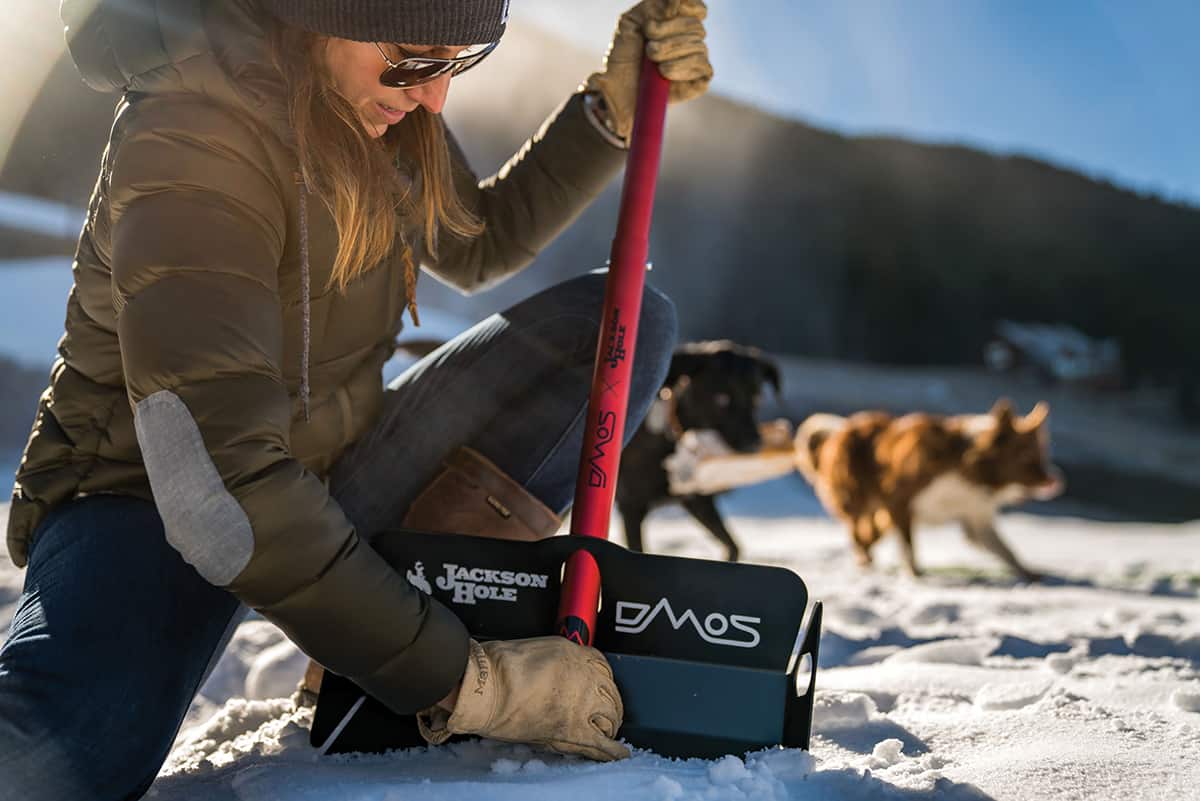Read The
Current Issue
Cents of Place
Inspired by this valley, these local businesses
have expanded well beyond it.
By Dina Mishev
JACKSON HOLE IS recognized around the country as a premier vacation destination, but not so much as a premier place to do business. Some seasons it seems restaurants and shops come and go with the rapidity of a fresh hatch on the Snake River. Wannabe workers sometimes can’t find (or afford) housing. Employers complain that workers disappear on powder days. But, for the right companies, there’s no place other than Jackson that they could have gotten their start.
DMOS

DMOS: “‘Do My Own S___’—we never finalized it,” says Harvard Business School alumna and former financial consultant Susan Pieper. In 2015, Pieper founded DMOS Collective, which makes lightweight shovels (some with serrated teeth for breaking up ice and compacted snow) with collapsible handles out of aircraft-grade aluminum alloy. Stuff? Shoveling? S&!% ?
Whatever consumers decide the “S” in DMOS stands for, they’re in agreement that these shovels are unlike anything on the market. In Silicon Valley parlance, where Pieper (in January 2018) secured Series-A investment from global investment firm Astia Angels, DMOS is disrupting America’s hardware industry. Prior to Astia’s investment, Pieper launched two Kickstarter campaigns. The first (in October 2015) raised $37,000, which exceeded Pieper’s goal by more than 80 percent; the second (started in December 2016) raised $205,000—more than 1,300 percent of its goal. Now DMOS Collective makes six different models of shovels that are sold on its own website and also at REI, Duluth Trading Company, Backcountry.com, Sportsman’s Warehouse, Moosejaw, and Huckberry. Articles in publications from Forbes to Men’s Journal say the shovels are “gear you can stake your life on.”
Pieper is the first to say that DMOS would not exist had she not moved to Jackson in 2012 with her son and now-ex-husband. She got the idea for a heavy duty, lightweight shovel while watching her snowboarding son, Steven Bailey, break shovel after shovel as he and friends built snow ramps and jumps in her East Jackson backyard. “I saw that lawn and garden tools were generic and dumbed down,” she says.
While DMOS’ original market was backcountry snowboarders and skiers—“The idea was that snowboarders would take it into the backcountry with them to build jumps,” Pieper says—she quickly realized the shovels had much wider appeal. Today DMOS customers include firefighters, disaster cleanup crews, ski patrols, rescue teams, and even the military. Also, “It’s become the shovel that every winter driver should have in their car,” Pieper says. “DMOS gives you the tools you need to get unstuck. It makes shovels essential emergency gear.”
DMOS isn’t the only success story to come out of Steven’s backyard terrain parks: He’s now ranked sixth in
the International Freeskiing and Snowboarding Association men’s 15-18 big mountain snowboarding league.
KATES REAL FOOD

In the early 2000s, if you were a diner at Nora’s Fish Creek Inn at the base of Teton Pass and got Kate Schade as your waitress, you might get a hand-rolled energy bar left with your bill. Schade, who moved to the valley in 1993 to ski as much as possible, worked part-time at Nora’s. In her own kitchen, she concocted calorie-rich energy bars to get her through long ski days. Schade called her bars, which included oats, honey, peanut butter, milk chocolate, brown rice crisps, dried apricots, raisins, sunflower seeds, sesame seeds, and sea salt, Tram Bars, because, well, she most often found herself eating them in the Jackson Hole Mountain Resort (JHMR) Aerial Tram line.
In 2007, after more than a decade of passing Tram Bars out to friends, Schade graduated to selling them in local stores like Teton Mountaineering and Jackson Whole Grocer. In 2010, with the idea of growing the company even more, she took on an investment partner and Tram Bars LLC was formed. At that time, you could find Tram Bars (and newer flavors like the Grizzly Bar) in stores in about twenty states; annual sales were about $100,000. By 2014, Kate’s bars were available in about thirty states, and annual sales had grown to about $700,000.
Today, Tram Bars LLC has changed its name to Kate’s Real Food and manufactures six different flavors of bars, all of which are organic and still handmade in Victor, Idaho. They’re available in stores in forty-six states and annual sales exceed $1 million. “Despite all the changes and the new name, the roots of the company haven’t changed at all,” Schade says. “Change happens, but not with our roots or our recipes.”
“To be honest, when I first started making the bars, I was just choosing ingredients I liked and that were of a high quality,” says Schade. “It was after I had a bar that I liked the taste of that I realized I had come up with something that had quick- burning carbs, slow-burning carbs, fats, and protein and could really sustain me when I went out on adventures. They are the perfect food for mountain towns and mountain adventures.”
Although Kate’s Real Food bars are now available across the country, Schade says she regularly gets emails from people who only discover them while vacationing in Jackson. “They’ll send me an email after they’ve gone home and then they notice the bars in a store there,” she says. “They’ll write that the bars remind them of their experience in Jackson Hole. These kinds of emails make my day.”
STIO

Stio launched its first product line in 2012. Founded by outdoor apparel veteran Stephen “Sulli” Sullivan, Stio’s goal from that very first collection was to capture the essence of Jackson Hole’s lifestyle in every piece of its clothing. “From top to bottom, concept to finished product, the entire company is fueled by a desire to remain authentic to the Jackson Hole lifestyle—an existence epitomized by adventure, conservation, and, of course, fun,” says Sulli, who prior to founding Stio founded the outdoor clothing company Cloudveil with Brian Cousins.
Chief product officer Kelly Hill Shuptrine is more direct: “Stio wouldn’t exist without Jackson,” she says. “That is our key differentiator. From a product point of view we are in the mountains and making products for people who want to be in the mountains. That’s very different from being in a metro area and creating products for the outdoor window syndrome.”
Shuptrine, who previously worked at Cloudveil and has been with Stio since 2012, says Stio infuses the Jackson Hole environment in “everything we do.” Influences from the Jackson Hole landscape and environment might inspire a particular print, or the clear blues seen in the sky here might be the perfect shade for a T-shirt. “The brand is all about Jackson Hole and our lifestyle here,” Sulli says.
IGNEOUS

Today Igneous Skis is called the “godfather of the independent ski movement.” But the company, based out of a nondescript workshop in an industrial neighborhood in West Jackson, didn’t start out with a grand plan to launch a movement. Adam Sherman and Mike Parris just wanted skis that could last a full season skiing Jackson Hole. “Igneous wouldn’t exist if it weren’t for Jackson; we started making skis because the skis that were commercially available couldn’t stand up to the terrain and conditions that we skied and rode here,” says Parris, who began making skis with Sherman in the late 1990s, became a partner in 2000, and bought the business outright in 2007 when Sherman moved to the East Coast for other job opportunities. “We were breaking skis all the time.”
Sherman founded Igneous on his own, and made his first pair of skis in 1994. Then he started making skis for friends and friends of friends, and Parris came on board. There was a brief period in the early 2000s when Igneous ramped production up to as many as 400 pairs a year, but Sherman and Parris quickly scaled back to around 100 pairs. “That keeps it manageable,” Parris says. “I like to get to know each client individually.” Ideally, Parris will take a run or two with every Igneous client, too. Parris likes skiing with Igneous clients because he’s not just making skis that can handle the unique demands of skiing in Jackson Hole, but that also meet specifications determined by the person skiing them.
Every pair of Igneous skis is custom and starts with a discussion with the client. “We talk about how and where and why they ski, what terrain and conditions they like, what skis they’ve had in the past, their experience skiing, how many days they ski, the boots and bindings they use, and where they want to go with skiing,” Parris says. It’s no wonder Igneous skis have been called “the Ferraris of skis.”
WYOMING WHISKEY

Leave it to three Jackson Hole attorneys to found Wyoming’s first legal distillery and then make the state’s first whiskey suitable for anything other than starting campfires. Wyoming Whiskey, which has its administrative offices in Jackson, a production facility in Kirby, Wyoming, and gets its non-GMO grain from Byron, Wyoming, was incorporated in 2006 and released its first batch of whiskey in December 2012. This past summer, the company entered into a “strategic partnership” with Edrington, an international premium spirits company that owns Macallan, Highland Park, Glenrothes, Cutty Sark, and The Famous Grouse.
“When we were starting out we weren’t thinking about partnering with an international company,” says David DeFazio, one of Wyoming Whiskey’s three lawyer-founders and its chief operating officer. “And now that we have, we’re not going anywhere. Wyoming Whiskey will still run Wyoming Whiskey. Edrington has no desire to change the way we make our whiskey other than offer insight into ways to make subtle refinements, and to expose it to more markets.”
On its own, Wyoming Whiskey grew its distribution to thirty-two states. The new partnership with Edrington will result in distribution of the brand in all fifty states, with international distribution on the horizon.
DeFazio and Wyoming Whiskey’s other founders, husband-and-wife cattle ranchers Brad and Kate Mead, credit Jackson Hole and Wyoming for the growth they were able to achieve on their own. “Jackson Hole’s tourism helped: When you have three to four million visitors coming through an area, it can help a brand grow,” says Brad Mead. “People come to Jackson, bring back a bottle as a special memory of their vacation, and then, drinking it back home, see that it is outstanding and turn friends on to it.”
Mead adds that the state of Wyoming helped the brand grow, too. “I think the liquor division of the state is our biggest customer,” he says. “At the very beginning, they took a chance on a new product. I don’t know that that would happen in other states.”
TETON GRAVITY RESEARCH

Todd and Steve Jones, two of the four founders of Teton Gravity Research (TGR), could have been happy starring in Warren Miller Entertainment (WME) films, which they were first asked to do in 1994. Except, when the brothers tried to take the WME film crew to their favorite spots, they protested. “We were excited to show them the Jackson Hole playground, and we tried dragging them all around the backcountry,” Steve Jones says. “But that’s not what they wanted.” The next year the Joneses, Dirk Collins, and Corey Gavitt pooled money they had earned working on commercial fishing boats in Alaska, bought camera equipment, and, despite none of them having any experience making movies, shot one.
Released in 1996, The Continuum “showcases what was going on in skiing, and did it in a younger, fresher way,” Jones says. He says this was possible in large part due to “the athletes that were here, like Doug Coombs and Rick Armstrong. There was this collective of athletes [in Jackson Hole] that we wouldn’t have had the benefit of elsewhere.”
Today The Continuum is in the U.S. Ski & Snowboard Hall of Fame and Museum and TGR has released 38 other movies. Jones says he’s seen people wearing TGR’s branded lifestyle clothing—hats, T-shirts, sweatshirts—as far afield as the Maldives. The company employs between forty and fifty people in its offices at the base of Teton Pass; has a retail shop on the Town Square (and soon also at the Jackson Hole Airport); partners with JHMR for kid’s ski and snowboard camps; annually donates the proceeds from the Teton Village premiere of its latest movie to a local nonprofit; is in talks with several dozens of stores in China that want to carry their clothing; was named one of the 20 most influential companies in the outdoor industry by Outside magazine; and recently came out with a full-length feature on bipolar disorder and a short film about cancer.
“As we went along, we started to recognize that we wanted to transcend action sports and tell stories about broader issues that affect more people,” Jones says. “Storytelling was always something that was important to us; the first statement that we wrote [when we were starting] was that we wanted to be the premier action sports brand in the world and we recognized that that wouldn’t just be daredevils and overly macho kind of stuff.”
Neither the bipolar film, Andy Irons: Kissed By God, nor the short, Mountain in the Hallway, is as far from TGR’s wheelhouse of action sports as it seems. The latter follows a former TGR employee and another Jackson resident as both men go through treatment for colorectal cancer and then try to climb the Grand Teton. The former is about three-time world champion surfer Andy Irons, who had bipolar disorder and died in 2010 from a heart attack brought on by opioid addiction. “The Andy Irons [project] is probably the highest level of filmmaking that we have achieved to date,” Jones says. He couldn’t share details, but says an HBO executive saw it and called to ask if the company would be interested in doing a documentary. “To me, that’s the next level of filmmaking,” Jones says. “And it all started in the Tetons.”





